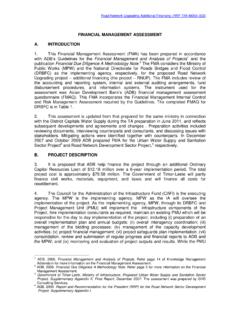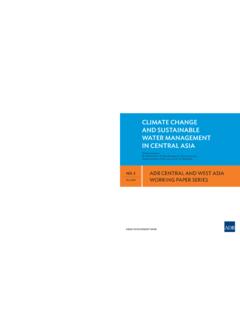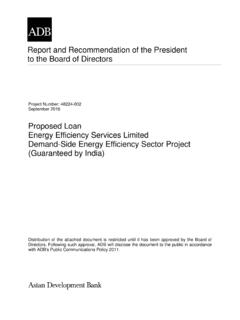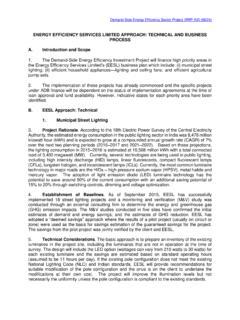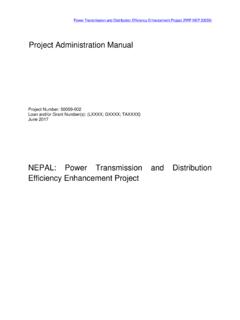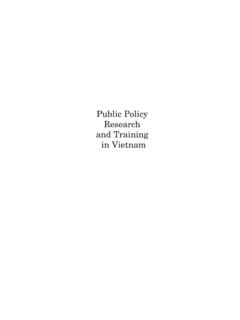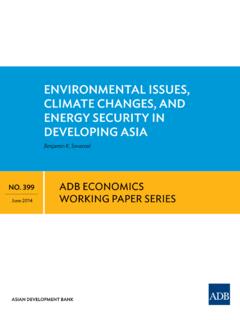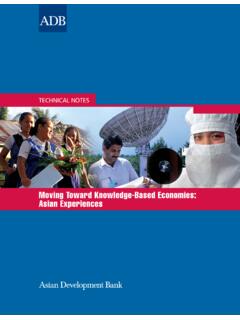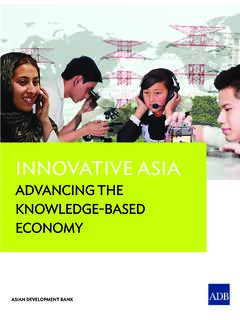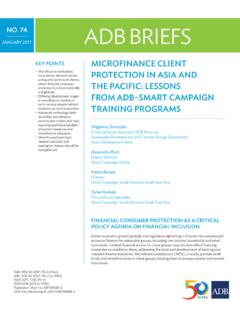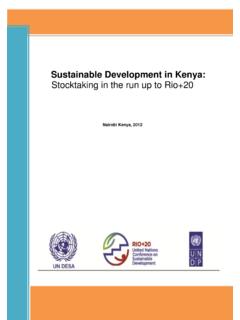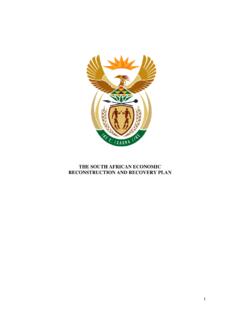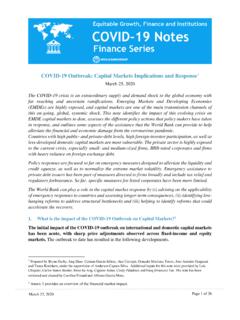Transcription of Big Data for Better Tourism Policy, Management, and ...
1 BIG DATA FOR Better Tourism POLICY, management , AND SUSTAINABLE recovery FROM COVID-19 DECEMBER 2021 BIG DATA FOR Better Tourism POLICY, management , AND SUSTAINABLE recovery FROM COVID-19 DECEMBER 2021Co-publication of the Asian Development Bank and the World Tourism Organization. Creative Commons Attribution-NonCommercial IGO license (CC BY-NC IGO) 2021 Asian Development Bank (ADB) and World Tourism Organization (UNWTO)Asian Development Bank World Tourism Organization (UNWTO) 6 ADB Avenue Calle del Poeta Joan Maragall, 42 Mandaluyong City 28020 Madrid 1550 Metro Manila Spain PhilippinesTel +63 2 8632 4444 Tel +34 915 67 81 00 Fax +63 2 8636 2444 E-mail rights reserved.
2 Published in 2021. ISBN ADB 978-92-9269-135-6 (print); 978-92-9269-136-3 (electronic); 978-92-9269-137-0 (ebook) Publication Stock No. SPR210438-2 DOI: ISBN UNWTO 978-92-844-2308-8 (print), 978-92-844-2309-5 (electronic) DOI: views expressed in this publication are those of the authors and do not necessarily reflect the views and policies of the Asian Development Bank (ADB) or its Board of Governors or the governments they represent, nor the views and policies of the World Tourism Organization (UNWTO) or its and UNWTO do not guarantee the accuracy of the data included in this publication and accept no responsibility for any consequence of their use.
3 The mention of specific companies or products of manufacturers does not imply that they are endorsed or recommended by ADB or UNWTO in preference to others of a similar nature that are not making any designation of or reference to a particular territory or geographic area, or by using the term country in this document, neither ADB nor UNWTO intend to make any judgments as to the legal or other status of any territory or area. The designations employed and the presentation of material in this publication do not imply the expression of any opinions whatsoever on the part of ADB or the Secretariat of the World Tourism Organization concerning the legal status of any country, territory, city or area, or of its authorities or concerning the delimitation of its frontiers or work is available under the Creative Commons Attribution-NonCommercial IGO license (CC BY-NC IGO)
4 By using the content of this publication, you agree to be bound by the terms of this license. For attribution, translations, adaptations, and permissions, please read the provisions and terms of use at # CC license does not apply to non-ADB/UNWTO copyright materials in this publication. If the material is attributed to another source, please contact the copyright owner or publisher of that source for permission to reproduce ADB nor UNWTO can be held liable for any claims that arise as a result of your use of the contact if you have questions or comments with respect to content, or if you wish to obtain copyright permission for your intended use that does not fall within these terms, or for permission to use the ADB logo.
5 For permission to use the UNWTO logo, please contact to ADB publications may be found at : In this publication, $ refers to United States dollars. ADB recognizes China as the People s Republic of China; Korea as the Republic of Korea; and Macao as Macau, China. On the cover: Beach in Chuuk State, in the Federated States of Micronesia. Many small island developing economies depend heavily on Tourism . Photo by design by Mike Cortes. Printed on recycled paperTables, Figures, and Boxes ---------------------------------------- --------------------------------vAbbrevi ations ---------------------------------------- ---------------------------------------- -----viForeword ---------------------------------------- ---------------------------------------- ---------viiAcknowledgments------------- ---------------------------------------- ---------------------------ixExecutive Summary ---------------------------------------- ---------------------------------------x I.
6 INTRODUCTION ---------------------------------------- ------------------------------------11. Big Data for Tourism ..12. The Impact of COVID-19 and Building Sustainable and Resilient WHAT IS Tourism BIG DATA? ---------------------------------------- --------------------51. Defining Big Data ..52. How Big Data Is Generated and Compiled ..63. Data Useful for Tourism ..7A. Big Data from Tourism Operators and Online Travel and Social Media ..7B. Shifts in Global Distribution of Travel Products ..104. Non- Tourism Specific Big Data ..12 III.
7 HOW GOVERNMENTS ARE USING Tourism BIG DATA -----------------------------161. Models of Engagement ..16A. Case Studies: Government-Led Big Data Programs with Application to Tourism .17B. Case Studies: Complementing Official Tourism Statistics ..21IV. BIG DATA CHALLENGES AND LIMITATIONS ---------------------------------------- --251. Challenges ..25A. Overall ICT Readiness and Cost ..25B. Data Privacy ..26C. Cybersecurity ..28D. Skills Gap ..28E. Structural Dependency ..29F. Small and Medium-Sized Enterprises Inclusion ..30G. Lack of Governance and Policy Support.
8 30H. Other Market-Driven Disincentives to Collaboration ..312. Limitations of Big Data for Tourism ..32A. Underlying Purpose of the Data ..32B. Selectivity Bias and Data Invisibles ..32C. Data Continuity ..33D. Managing the Limitation of Big Data in Tourism ..33iiiCONTENTS3. Creating an Enabling Environment for Big Data Opportunities ..33A. Emergence of Data Philanthropy ..34B. Public Private Partnerships ..34V. USING BIG DATA FOR recovery AND REGIONAL COOPERATION IN Tourism 361. Impact of COVID-19 on Digitalization ..36A. Travel and Tourism SMEs Adopt Digital Platforms.
9 372. Case Studies: Big Data Helps Tourism Sector Recover from COVID-19 ..373. Role of Big Data in Post-COVID-19 Regional Cooperation ..41A. Inflection Point for Seamless Travel ..42B. Health Certificates and Blockchain-Enabled Travel ..42C. Harmonizing Regional Health Data and Travel Technology ..434. Looking for Innovative Solutions and Advancing Regional Cooperation and Integration ..45VI. BIG DATA FOR SUSTAINABLE Tourism recovery ---------------------------------461. Toward New Measurement Frameworks ..462. Financing Needs of Post-COVID-19 Sustainable recovery .
10 48 VII. CONCLUSION AND POLICY RECOMMENDATIONS -----------------------------------51 Appendix: Skills Required for Big Data Collection and Analysis ------------------------------54 References ---------------------------------------- ---------------------------------------- -------58 ContentsivTABLES1 Primary Locations, Categories, and Sources of Big Data ..62 Big Data Captured by Tourism Operators, Online Travel Sources, and Social Media ..123 Key Big Data Captured by Non- Tourism Specific Providers ..134 Skills Required to Use Big Data ..295 Examples of Key Statistical Data and Indicators on the Social, Environmental, and Economic Impacts of Tourism at National and/or Subnational Levels.
